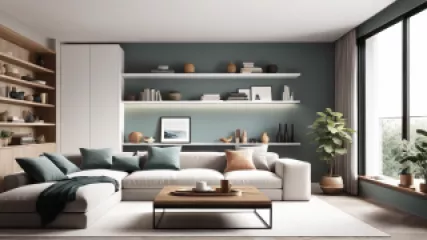Declutter Your Space: A Step-by-Step Guide to Addressing Clutter-Induced Stress
Do you ever feel overwhelmed by the clutter in your living space? Are you constantly stressed or anxious because of the mess around you? If so, you're not alone. Many people struggle with the psychological effects of clutter and the impact it can have on their mental well-being. In this step-by-step guide, we will explore the psychology of clutter and provide practical tips to help you declutter your space and address the stress it may be causing.
The Psychology of Clutter
Clutter is more than just a physical inconvenience; it can also affect our mental health. Studies have shown that living in a cluttered environment can lead to increased levels of stress, anxiety, and even depression. The presence of excessive clutter can make it difficult for us to focus, relax, and feel at peace in our own homes.
One reason clutter can be so mentally draining is that it overloads our senses. Our brains are constantly processing information from our surroundings, and when we are surrounded by clutter, our minds have to work harder to filter out irrelevant stimuli. This constant bombardment of sensory input can leave us feeling mentally drained and overwhelmed.
In addition, clutter can also trigger feelings of guilt, shame, and embarrassment. We may feel guilty for not being able to keep our spaces tidy or ashamed to have others see the mess. These negative emotions can further contribute to our stress levels and hinder our ability to address the clutter effectively.
The Benefits of Decluttering
Decluttering your space can have a profound impact on your mental well-being. By creating an organized and tidy environment, you can experience the following benefits:
- Reduced stress: A clutter-free space can promote a sense of calm and tranquility, reducing stress levels and improving overall mental health.
- Enhanced focus: When your environment is free from distractions, you can better concentrate on the task at hand and improve your productivity.
- Improved mood: A clean and organized space can uplift your mood and create a positive atmosphere in your home.
- Increased efficiency: With less clutter, you can find things more easily, saving time and energy in your daily routines.
- Boosted self-esteem: Taking control of your living space and maintaining an organized environment can boost your self-confidence and sense of accomplishment.
Step-by-Step Guide to Decluttering Your Space
Now that we understand the psychological impact of clutter and the benefits of decluttering, let's dive into a step-by-step guide to help you reclaim your space and improve your mental well-being.
Step 1: Set Clear Goals
Start by setting clear goals for your decluttering journey. What do you want to achieve? Do you want to declutter your entire home or focus on specific areas? Setting specific, achievable goals will help you stay motivated throughout the process.
Step 2: Create a Plan
Once you have your goals in mind, create a decluttering plan. Break down your space into smaller, manageable sections, such as individual rooms or categories (e.g., clothes, books, kitchen). This will prevent you from feeling overwhelmed and allow you to tackle one area at a time.
Step 3: Sort and Categorize
Next, start sorting your belongings into categories. Create piles for items you want to keep, donate, sell, or discard. Be honest with yourself and let go of things that no longer serve a purpose or bring you joy. Remember, decluttering is about creating a space that supports your well-being.
Step 4: Start Decluttering
With your categories defined, it's time to start decluttering. Begin with one section at a time, focusing on the items you have identified for donation, sale, or disposal. Use containers or boxes to keep your piles organized and make the process more efficient.
Step 5: Organize and Store
As you declutter, take the opportunity to organize and store the items you choose to keep. Invest in storage solutions such as bins, shelves, or drawer organizers to maximize space and maintain an organized environment. Make sure everything has a designated place to avoid future clutter.
Step 6: Maintain Your Decluttered Space
Decluttering is not a one-time task; it requires ongoing maintenance. Develop daily habits to keep your space tidy, such as putting things away after use, doing regular quick clean-ups, and avoiding impulsive purchases that may lead to unnecessary clutter.
Seeking Additional Support
While decluttering can be a transformative process, it's important to recognize when you may need additional support. If you find that clutter-induced stress is significantly impacting your mental health and daily functioning, consider reaching out to a mental health professional for guidance.
Therapy sessions for clutter management can provide valuable insights and strategies to address the underlying psychological factors contributing to clutter. A therapist can help you develop coping mechanisms, explore the emotional attachment to belongings, and support you on your journey towards a clutter-free life.
"Clutter is not just physical stuff. It's old ideas, toxic relationships, and bad habits. Clutter is anything that does not support your better self." - Eleanor Brownn
Conclusion
Decluttering your space is not just about creating a visually pleasing environment; it's about addressing the psychological impact clutter can have on your mental well-being. By following this step-by-step guide, setting clear goals, and seeking support when needed, you can reclaim your space, reduce clutter-induced stress, and cultivate a more peaceful and harmonious living environment.
Remember, decluttering is a journey, and it's okay to start small. Celebrate your progress along the way and enjoy the positive effects of a clutter-free life.






